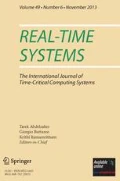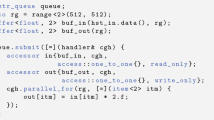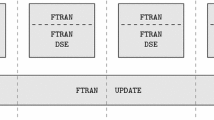Abstract
Optimal multiprocessor real-time schedulers incur significant overhead for preemptions and migrations. We present RUN, an efficient scheduler that reduces the multiprocessor problem to a series of uniprocessor problems. RUN significantly outperforms existing optimal algorithms with an upper bound of O(logm) average preemptions per job on m processors (fewer than 3 per job in all of our simulated task sets) and reduces to Partitioned EDF whenever a proper partitioning is found.


















Similar content being viewed by others
References
Andersson B, Tovar E (2006) Multiprocessor scheduling with few preemptions. In: IEEE embedded and real-time computing systems and applications (RTCSA), pp 322–334
Andersson B, Bletsas K, Baruah SK (2008) Scheduling arbitrary-deadline sporadic task systems on multiprocessors. In: IEEE real-time systems symposium (RTSS), pp 385–394
Baruah SK (2001) Scheduling periodic tasks on uniform multiprocessors. Inf Process Lett 80(2):97–104
Baruah SK, Goossens J (2004) Scheduling real-time tasks: algorithms and complexity. In: Leung JYT (ed) Handbook of scheduling: algorithms, models, and performance analysis. Chapman Hall/CRC Press, London/Boca Raton
Baruah SK, Mok AK, Rosier LE (1990) Preemptively scheduling hard-real-time sporadic tasks on one processor. In: IEEE real-time systems symposium (RTSS), pp 182–190
Baruah SK, Cohen NK, Plaxton CG, Varvel DA (1993) Proportionate progress: a notion of fairness in resource allocation. In: ACM symposium on the theory of computing (STOC). ACM, New York, pp 345–354
Baruah SK, Cohen NK, Plaxton CG, Varvel DA (1996) Proportionate progress: a notion of fairness in resource allocation. Algorithmica 15(6):600–625
Cho H, Ravindran B, Jensen ED (2006) An optimal real-time scheduling algorithm for multiprocessors. In: IEEE real-time systems symposium (RTSS), pp 101–110
Deng Z, Liu JWS, Sun J (1997) A scheme for scheduling hard real-time applications in open system environment. In: Euromicro conference on real-time systems (ECRTS), pp 191–199
Easwaran A, Shin I, Lee I (2009) Optimal virtual cluster-based multiprocessor scheduling. Real-Time Syst 43(1):25–59
Emberson P, Stafford R, Davis RI (2010) Techniques for the synthesis of multiprocessor tasksets. In: Workshop on analysis tools and methodologies for embedded and real-time systems (WATERS), pp 6–11. http://retis.sssup.it/waters2010/data/taskgen-0.1.tar.gz
Funaoka K, Kato S, Yamasaki N (2008) Work-conserving optimal real-time scheduling on multiprocessors. In: Euromicro conference on real-time systems (ECRTS), pp 13–22
Funk S (2010) LRE-TL: an optimal multiprocessor algorithm for sporadic task sets with unconstrained deadlines. Real-Time Syst 46(3):332–359
Funk S, Levin G, Sadowski C, Pye I, Brandt S (2011) DP-Fair: a unifying theory for optimal hard real-time multiprocessor scheduling. Real-Time Syst 47(5):389–429
Hochbaum DS (ed) (1997) Approximation algorithms for NP-hard problems. PWS, Boston
Kato S, Yamasaki N, Ishikawa Y (2009) Semi-partitioned scheduling of sporadic task systems on multiprocessors. In: Euromicro conference on real-time systems (ECRTS), pp 249–258
Koren G, Amir A, Dar E (1998) The power of migration in multi-processor scheduling of real-time systems. In: ACM-SIAM symposium on discrete algorithms (SODA), pp 226–235
Levin G, Sadowski C, Pye I, Brandt S (2009) SnS: a simple model for understanding optimal hard real-time multi-processor scheduling. Tech. Rep. UCSC-SOE-11-09, Univ. of California, Santa Cruz
Levin G, Funk S, Sadowski C, Pye I, Brandt S (2010) DP-Fair: a simple model for understanding optimal multiprocessor scheduling. In: Euromicro conference on real-time systems (ECRTS), pp 3–13
Liu CL (1969) Scheduling algorithms for multiprogram in a hard real-time environment. JPL Space Programs Summary II:37–60
Liu CL, Layland JW (1973) Scheduling algorithms for multiprogram in a hard real-time environment. J ACM 20(1):46–61
Liu JWS (2000) Real-time systems. Prentice-Hall, New York
Massa E, Lima G (2010) A bandwidth reservation strategy for multiprocessor real-time scheduling. In: IEEE real-time and embedded technology and applications symposium (RTAS), pp 175–183
McNaughton R (1959) Scheduling with deadlines and loss functions. Manag Sci 6(1):1–12
Moir M, Ramamurthy S (1999) Pfair scheduling of fixed and migrating periodic tasks on multiple resources. In: IEEE real-time systems symposium (RTSS), pp 294–303
Nelissen G, Berten V, Goossens J, Milojevic D (2011) Reducing preemptions and migrations in real-time multiprocessor scheduling algorithms by releasing the fairness. In: IEEE embedded and real-time computing systems and applications (RTCSA), pp 15–24
Regnier P, Lima G, Massa E, Brandt S LG (2011) Run: optimal multiprocessor real-time scheduling via reduction to uniprocessor. In: IEEE real-time systems symposium (RTSS), pp 104–115
Spuri M, Buttazzo G (1996) Scheduling aperiodic tasks in dynamic priority systems. Real-Time Syst 10(2):179–210
Stafford R (2006) Random vectors with fixed sum. http://www.mathworks.com/matlabcentral/fileexchange/9700
Zhu D, Mossé D, Melhem R (2003) Multiple-resource periodic scheduling problem: how much fairness is necessary? In: IEEE real-time systems symposium (RTSS), pp 142–151
Zhu D, Qi X, Mossé D, Melhem R (2011) An optimal boundary fair scheduling algorithm for multiprocessor real-time systems. J Parallel Distrib Comput 71(10):1411–1425
Acknowledgements
This work was funded by CAPES (Brazil), CNPq (Brazil), NSF (USA) and Los Alamos National Laboratory (USA).
Author information
Authors and Affiliations
Corresponding author
Additional information
A preliminary version of this work has been published in the Proceedings of the 32nd IEEE Real-Time Systems Symposium, 2011, pages 104–115 (Regnier, Lima, Massa, Levin and Brandt 2011) held in Vienna, Austria. It received the Best Paper Award.
Rights and permissions
About this article
Cite this article
Regnier, P., Lima, G., Massa, E. et al. Multiprocessor scheduling by reduction to uniprocessor: an original optimal approach. Real-Time Syst 49, 436–474 (2013). https://doi.org/10.1007/s11241-012-9165-x
Published:
Issue Date:
DOI: https://doi.org/10.1007/s11241-012-9165-x




